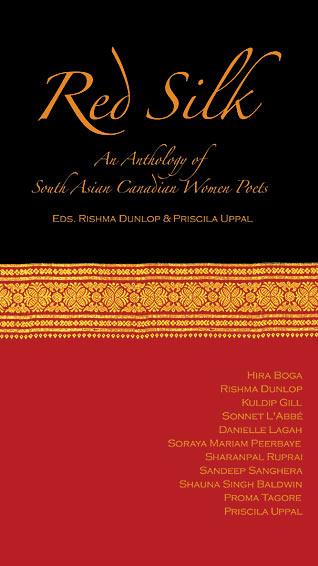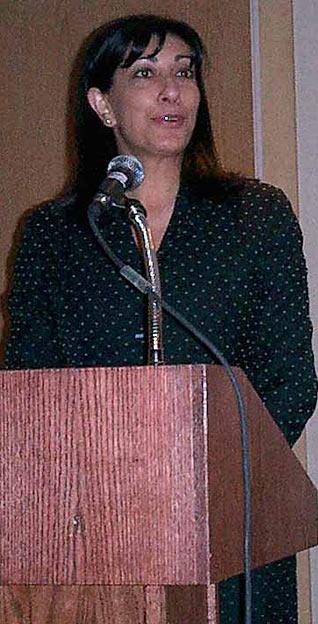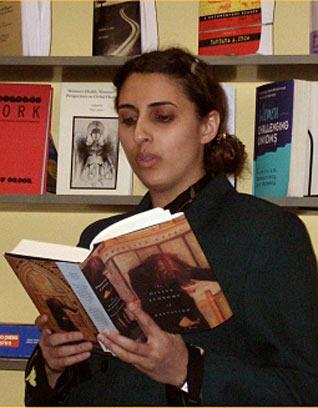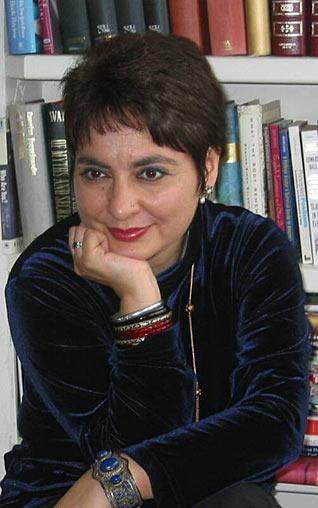Poetry
Red Silk
RED SILK: AN ANTHOLOGY OF SOUTH ASIAN WOMEN CANADIAN POETS
Edited by Rishma Dunlop and Priscila Uppal
Published by Mansfield Press, Toronto, 2004
ISBN 1-894469-16-X
184 pages Price: $19.95 CDN, $15.95 US
Reviewed by LAURIE BOLGER
Red Silk is a vibrant and eclectic compilation that highlights the "new wave" of poetry being written by South Asian Canadian women, charting their explorations of national and cultural identity and how they relate to memory, history, class and gender issues.
Six of the anthology's eleven poets, including both its editors, are of Sikh heritage.
It is the brainchild of Rishma Dunlop, a professor of Literary Studies at York University in Toronto, Canada. Dunlop co-edited this work with Priscila Uppal, a professor of Humanities and coordinator of the creative writing program at the same institution.
Both Dunlop and Uppal not only contributed their own poems to Red Silk, but also jointly authored the work's excellent Introduction, entitled "Travelers, Like Us". This section of the book underscores the diversity in backgrounds of both editors, as well as their nine fellow poets, stressing the fact that there is no such thing as a monolithic South Asian Canadian culture.
Some of the writers were born in Canada, others immigrated as children, either directly from the Subcontinent, or via Britain or a former British colony. Many are of mixed race. While all consider themselves "firmly Canadian writers", their hybridity is something they feel should be fully and freely celebrated, not grieved or hidden in any way.
In this "portfolio-style" anthology, each poet is represented by an impressively substantial body of work, not just one or two pieces. All of the writers have also provided a "Poet's Statement" of their own composition, affording a glimpse into their creative objectives and philosophy, as well as any other information they deemed pertinent.
The book's title is replete with meaning for women of South Asian heritage. Culturally, red is the color of happiness and joyful celebration, especially symbolic of traditional brides. These connotations have led the writers whose works appear in this collection to explore their ideas of female stereotypes and their notions of tradition, transplantation, submission and oppression.
While none of the pieces could be categorized as "exercises in nostalgia", memory takes center stage throughout the book. Many poems deal not only with how history is remembered, but also with how it is invented and reinvented.
Travel is also a pervasively dominant theme. The poems are filled with the energy of movement. Geographic and linguistic identities converge and merge. Boundaries of culture and gender are transitory and fluid. In many selections, it is through imagination that the greatest distances are traversed, as the poets "venture abroad" into their own inner spaces, intrepidly delving into highly private issues, such as their personal religious practices, in a very visible and public way.
While some of the pieces are indeed closely linked with South Asian mores and traditions, many others deal with basic human desires intrinsic to every culture - the yearnings we all feel to experience the intimacy and commitment of love, and to find a true home for our hearts. These longings are totally universal, as Rishma Dunlop opines in her exquisitely sensitive "Naramata Road": "There is a soft spot in everything ... there is tenderness in every geography."
Brief notations about the life and works of each of the six Sikh poets I intend to focus on in this review, quoted directly from the "Biographical Notes" section of Red Silk, can be found at the end of this review.
Although the contributions of the non-Sikh writers are beyond the scope of this piece, their authors' names nonetheless deserve mention. They are (in order of appearance): Hiro Boga, Sonnet L'Abbé, Danielle Lagah, Soraya Peerbaye, and Proma Tagore.
In my opinion, Sharanpal Ruprai might be considered the most "overtly Sikh" writer of this compilation. All of her contributions clearly revolve around the Sikh articles of faith. Her fifteen poems are divided into three groups of five works each, dealing with Kesh, Kachhera and Kirpan. They highlight a variety of conflicts created by wearing (or not wearing) these Kakaars, and explore the choices Sikhs of both sexes and a variety of ages make regarding the maintenance of their religion and culture in a Canadian milieu.
In "Man of Steel", she witnesses an act of male bonding between her father and brother, as they prepare for a turban-tying lesson. "They fold the sheet in half and half again, / an umbilical cord between them. / Bringing himself closer and closer / to his son, my father folds up distance / and leads my brother to the next stage."
The middle-aged protagonist of "Rootless" removes her Kachhera for the first time in her memory, admires herself in a bathing suit, and discovers the pleasures of swimming.
"...she kicks and twists in search of ground
and remembers a time when she was confined
she exhales legs sink still she's weightless, a woman
on the moon."
"Kirpan" is a five-part prose poem, capped by the empowering closing line: "don't be afraid to use it". In the penultimate section, a woman majestically exits a gurdwara stage, having been denied the right to perform music before the sangat. "green chuni on her head, her Kara on her right wrist her Kirpan across her / body she strides out without glancing back from that day on god became a / Woman and she was in need of warriors".
Shauna Singh Baldwin's selections evince a mix of emotions, ranging from humor to aching loss. Her wish to receive the same commercial acknowledgment as followers of Judeo-Christian religions is wryly shown in "Gurpurb": "And tell Hallmark / to start a new line of cards / for Sikh people."
In the poignant piece, "The Night She Left Lahore", a couple, unbeknownst to them, is about to be separated forever by Partition. As "Indians coagulated into their religions" and "A new country spawned its amoebic shape within the map", a man helps his wife and their children into a horse-drawn cart, promising he will soon rejoin them. At the end of the poem, the reader learns that more than fifty years later, this reunion never came to pass. "From leaden nights on her / charpai in Delhi she lofts her / question across the border / to Lahore: ‘What shall I do now / with the loveliness of the moon?'"
Many of Kuldip Gill's poems are written in structured, carefully-crafted verse forms, including ghazals, sonnets and glosas. A longtime resident of British Columbia, her piece, "Mrs. Spilsbury at the Plough -- Whonnock, 1911", reflects Sikh pioneer life in the Canadian West. "The four turbaned men stand relaxed, / their arms hang loose from their shoulders, perhaps / astounded by her resolve. They have propped up Spilsbury House."
Sandeep Sanghera attributes the sources of her work to her upbringing amongst female storytellers and mythmakers. This is evidenced in "Village Witness", where a woman determinedly persists in her task of creating and transmitting oral history. "in delhi heat / i will tell tales / of the things that happen when ground gives way/ . . . / (though you still will not believe) / still a village will bear the weight of my tale / and the weight of your disbelief."
Priscila Uppal, one of this book's two editors, has contributed a long poem sequence, entitled, "Poem for a Runaway Mother". In her own words, it "explores the nature of invention as a consolation for grief". Although particular women are not specifically mentioned, the imaginary figure of a daughter searching for her missing mother appears in each piece. In the last segment of the series, "Hide and Seek", a reunion has still not taken place: "Your little girl waits patiently, /Almost stubbornly, / In the last place / She knows you will look."
According to the anthology's other editor, Rishma Dunlop, travel appears "as a vehicle for memory and as a form of creation", both "in the post-colonial experience of childhood, and the urban cityscape of adulthood". In "Ancestors", she takes the reader on a colorful tour of India - her mother's land, where she, too, was born. While she can envision her forebears in vivid detail, she herself remains a stranger to them: "old women in desert white saris, / turbanned sirdars, / the young women with amber skin, hair and brows as black as crows wings, eyes of lionesses in heat / ... / Somewhere out of them, alive or dead I have sprung / yet no one seems to recognize me. / No one."
However, another line of this poem leaves us with the impression that somehow this does not matter, that the protagonist is, nevertheless, fully cognizant of her own identity: "Today my passport reads Nationality: Canadian."
Just as the poems of all eleven contributors often transcend conventional notions of what it means to be Canadian, so, too, do they defy any attempts at firm categorization. The experiences they relate cannot be delineated by borders on a map or pigeonholed within strict divisions of culture, gender and religion. They lead their readers, regardless of personal background, to examine the plethora of ways in which ideas of selfhood, family and home can be defined.
Whoever approaches this splendid anthology with an open mind and a receptive heart will not come away disappointed.
*************************
BIOGRAPHICAL NOTES
SHARANPAL RUPRAI grew up in Winnipeg, Manitoba and is a graduate of the University of Winnipeg. She has taught middle years for three years in Winnipeg. Currently, she is working on her Masters in English at the University of Calgary with a focus on South Asian writing. Her work has appeared in Exposed, an anthology of five Winnipeg women writers and Prairie Fire's special issue entitled Race Poetry Eh?
SHAUNA SINGH BALDWIN is a Canadian-American writer. Her books of fiction include the award-winning What the Body Remembers (Doubleday, Knopf Canada, 1999) and English Lessons and Other Stories (Goose Lane, Canada, 1996). Her new novel, The Tiger Claw (Knopf, 2004), was shortlisted for the Giller Prize.
KULDIP GILL was born in Punjab, India, raised in the Fraser Valley, and lives in Vancouver, B.C. with her husband. She received her Ph.D. (Anthropology) from the University of British Columbia and now holds an MFA in Theatre, Film and Creative Writing (UBC). Her recent books are Dharma Rasa (Nightwood Editions, 1999); two limited edition small books: Cornelian, Turquoise and Gold (Colophon Books, 2003), and Ghazals: Rai and Sohni (Frog Hollow Press, 2003).
Born in India, SANDEEP SANGHERA immigrated to Canada in 1975. She holds an MA in English from the University of Toronto and currently resides in Mexico City where she teaches political poetry at a preparatory college. Her literary interests include writings from Latin America, the Caribbean, and the Indian sub-continent. She is at work on her first novel exploring the echoes between Indian classical dance and flamenco, an echo that is used to explore the blurring and layering of cultural identities.
PRISCILA UPPAL was born in Ottawa in 1974 and currently lives in Toronto. She has published four collections of poetry: How to Draw Blood from a Stone (1998), Confessions of a Fertility Expert (1999), Pretending to Die (2001), and Live Coverage (2003); all with Exile Editions. Her first novel, The Divine Economy of Salvation (2002), was published to international acclaim by Doubleday Canada, Algonquin Books of Chapel Hill US, and translated into Dutch and Greek. She is a professor of Humanities and Coordinator of the Creative Writing Program at York University, Toronto.
RISHMA DUNLOP was born in India and grew up in Beaconsfield, Quebec. She is the author of several books of poetry including The Body of My Garden (2002), Reading Like a Girl (2004) and the forthcoming Naramata Road. She was a finalist for the CBC/Saturday Night Canada Council Award for Poetry in 1998 and recipient of The Emily Dickinson Award in 2003. She is a professor of Literary Studies in the Faculty of Education and the School of Women's Studies at York University in Toronto.
[Top image: Book cover, courtesy - www.meerasethi.com]






